- Home
- Maggie Stiefvater
Mister Impossible Page 3
Mister Impossible Read online
Page 3
He liked being asked by a dreamer to think about her in the context of his dreams.
Finally, Bryde took the snake from Hennessy and released her carefully back into the underbrush. He said, somewhat bitterly, “This is a museum to the waking; what would the artifacts of a world of dreamers look like? This is a civilization so sure of its own inadequacy and entitlement that it forever tries to drown out the din of other species with its own miserable white noise of failed ambition and masturbatory anxiety. A few voices cry out against it—what if those voices were the majority? What a world. Now: masks.”
Ronan withdrew his mask from his jacket. The two simple, silken masks had been one of the first things they’d dreamt with Bryde—masks that made the wearer go instantly to sleep. Bryde vastly preferred them to the dreamt sleeping pills Ronan had used before they met.
Don’t eat dreams, Bryde had chastised him. At best they’ll starve you and at worst they’ll control you. Dreams are like words, they’re like thoughts. They always mean more than one thing. Are you sure those pills only made you sleep?
Ronan’s hands felt hot; his heart was beginning to pound. It had only taken a few weeks for the masks to generate a Pavlovian response in him.
Bryde swept his gaze over the ruined space. “Let’s find a safe place to dream.”
To dream. To dream: urgently, purposefully. To dream: with other dreamers.
That enormous, warm feeling was charging up inside Ronan again, big enough now that he could tell what it was:
Belonging.
Hennessy dreamt of the Lace.
It was always the same dream.
It was dark. She was meaningless in this dream. Not a cog in a machine, not a blade of grass in a field. Possibly a speck of dust in the baleful eye of a loping beast, blinked away. But nothing more.
Slowly, the dream illuminated, and the light revealed a thing that had been there all along. A thing? An entity. A situation. Its edges were jagged and geometric, intricate and ragged, a snowflake beneath a microscope. It was enormous. Enormous not like a storm or a planet, but enormous like grief or hatred.
This was the Lace.
It was not really a thing one saw. It was a thing one felt.
When Hennessy had first dreamt Jordan into being, Jordan slept curled up behind her, her presence at once comforting and off-putting. Comforting because she was warm, familiar, entirely the same as Hennessy. But also off-putting because Hennessy, used to sleeping alone for ten years, would startle awake as Jordan’s breath just barely moved the hairs on the back of her neck. It’s impossible to prepare for the creeping strangeness of having dreamt a copy into being. Hennessy didn’t know what she owed Jordan beyond a body here in the waking realm. She didn’t know whether she and Jordan were going to be best friends or rivals. She didn’t know if Jordan might try to usurp Hennessy’s life. She didn’t know what to do if Jordan rejected it and struck off on her own. She didn’t know what to do if Jordan embraced it and stayed with Hennessy forever and ever and ever. It was possible she might not be alone ever again, but she didn’t know if that was a good thing or a bad thing.
That feeling?
That was the Lace.
After Hennessy had first dreamt June, the second copy, she had padded down the hallway of her father’s new suburban hole in the middle of the night, dragging her fingers across the wall because her mother had told her leaving oil on flat surfaces was a form of rebellion. Then suddenly she saw herself looming at the end of the hall. Impossible, she thought. I left Jordan in the room, and then she remembered June existed. But this was no comfort, because there should have never been another one after Jordan, and what if June wasn’t a direct copy but rather a monster with Hennessy’s face, and what if there was going to be another copy after her, and another one, and then Hennessy began to scream and scream and scream, and June started to scream and scream and scream, until Hennessy’s father shouted from his room what in Heaven’s name, if she had a problem, come into the master and explain it to him, or quit raising the roof and let everyone sleep, for God’s sake.
That feeling?
That was the Lace.
Sometimes, when Hennessy’s mother, J. H. Hennessy, had still been alive, she’d put a mink brush in her daughter’s hand and instruct her on how to move it over a canvas she’d already started work on. Hennessy would be full of the pride and terror that came from knowing she was making marks on a painting meant for high rollers and fancy shows. For minutes or hours, she and her mother would work in soundless partnership on the canvas, until it was difficult to tell which one of them had made which mark. Then her father, Bill Dower, would come home, and as soon as the door closed behind him, Jay would snap at Hennessy and snatch her brush back with enough force to tip palettes and spatter canvases. Mother, gone. Wife, arrived. Jay was two different people, and the changeover was dramatic. Hennessy, too, changed over, from heart-in-mouth joy to confused shame in a moment.
That feeling?
That was the Lace.
Hennessy had spent a decade torn between loving and resenting her clones, fearing they would leave her, wishing they would stop needing her, and then Jordan had told her they’d all been shot in the fucking face by Moderators and she’d never see them again, so it became a moot point.
That feeling?
That was the Lace.
Huge, unavoidable, inevitable.
Exhausting.
“Hennessy,” said Bryde.
Just like that, the Lace was gone.
When Bryde arrived in her dream, the Lace always vanished. It was afraid of him. A neat trick. Hennessy wanted to know why.
“That’s not important,” Bryde said. “What do you feel?”
Since meeting Ronan and Bryde, she’d spent more time than ever before wondering what it was like for other people to dream. She dreamt of the Lace. Always and forever. But most other dreamers had a different dream each night. Although she must have dreamt of something besides the Lace at some point, she could neither remember nor imagine what that was like.
She wondered how Ronan and Bryde found her in dreamspace. They fell asleep, had their own dream, and then—
“Be present,” Bryde said. “Stop wandering. How much power do you feel?”
A fuckload, Hennessy thought. Enough to dream something huge. Enough to bring the Lace out in its entirety.
“Stop calling the Lace,” Bryde said. “I won’t let it come back.”
I wasn’t calling it.
Bryde smiled thinly. Other people revealed themselves when they smiled. Tough folks became teddy bears; sentimental huggers revealed sharp-toothed gossips; shy people showed goofy clowns; class clowns turned out to be bitter depressants. But not Bryde. He was an enigma before and an enigma after.
“Where is your voice? Be present. Now look. I’ve given you a canvas and you’ve left it blank,” Bryde said, gesturing around them. Now that the Lace was gone, the dream held just their conversation, nothing else. “Laziness is the natural child of success. Who, after struggling up the ladder, feels like building another ladder? The view is already good. You’re not trying. Why?”
Hennessy’s voice was still just thought. There’s a word for someone who tries the same thing over and over again expecting a different result.
“Artist?” suggested Bryde. “You didn’t use to mind failure.”
She was annoyed that he was right.
Hennessy had spent her youth studying how pigment behaved, how badger bristles splayed paint versus squirrel versus hog versus kolinsky sable, how complementary colors accentuated each other or canceled each other out, how the human skeleton was constructed beneath the skin, working on every flat surface that presented itself to her. Trying. Failing. She’d also spent an equal amount of time, or more, on training her mind. Perception and imagination were always the weakest link in any artist’s chain. Eyes saw what they wanted to see instead of what was truly there. Shadows became too dark. Angles went crooked. Shapes got elongated, crushe
d. The brain had to be taught to see without feeling, and then to put feeling back in.
Fail, try again, fail, try again.
She couldn’t remember how she’d ever had the bandwidth to do that for so many hours and days and weeks and years.
“This is better,” Bryde said.
The dream had become a studio.
Hennessy hadn’t consciously thought of putting them in a studio, but dreams were crafty bastards that way. They gave you what you wanted, not what you said you wanted.
The studio was as good as reality. It smelled wonderful and productive, earthy and chemical. Multiple easels displayed canvases in all sizes. Paint glistened on palettes. Brushes stood on handles like bristled bouquets. Drop cloths covered the old wood floor. Bryde sat in a chair next to a wall of windows, his legs crossed casually, arm across the back of the chair. Jordan would have said he’d make a good portrait subject. The view beyond him was a city of historical buildings and close-set trees and invading highways. A distant storm mounted, the clouds tattered and checkered.
The dream was trying hard, in the way that dreams do, to imply that Hennessy had been to this studio before, although she knew she hadn’t.
It’s Jordan’s studio, the dream said. If you don’t recognize it, it’s only because it’s been too long since you’ve seen her. Why don’t you keep up with her like you used to?
Hennessy disagreed. “She doesn’t keep up with me.”
“There you are. Found your voice,” Bryde said. “You are not two things. You are not Hennessy, asleep, and Hennessy, awake. You are more than the sum of your feelings, your id. You are also the things you have learned to do about them. Dreaming, waking. They’re the same thing for you; when will you believe it? Put something on that canvas. The ley line is listening. Ask it for what you want.”
Hennessy stood before a canvas as tall as herself. In her hand was a brush, which was also a knife. She could picture the feeling of the blade piercing the canvas, the way the weave would shrink back from the wound. How splendidly and dramatically it would ruin the perfect flat expanse of the canvas.
“Let’s have Hennessy the artist,” Bryde said sharply. “The Hennessy who creates instead of destroys. What would she do if she could do anything?”
“Jordan’s the one you’re talking about,” Hennessy said. “She’s the artist; I’m the forger.”
“There are not two of you.”
“You need glasses, mate,” Hennessy said.
“You were an artist before you made Jordan.”
But Hennessy couldn’t remember that far back. Not in a meaningful way.
“Fine,” Bryde said, annoyed. “Show me what she would do right now. I assume she listens better.”
How would Jordan use this dreamspace? What if Hennessy were the dream and Jordan were the one with all this incredible power instead?
Art, Jordan had told Hennessy once, is bigger than reality.
The knife disappeared; Hennessy was already painting. Beneath the brush’s soft bristles was a rich stripe of gorgeous purple, a purple no human had ever seen before.
Jordan would love it. Tyrian purple looked dowdy beside this color.
Why hadn’t Jordan tried harder to come with Hennessy on this latest adventure?
You know why, the dream snarled.
Jordan had taken off with Declan Lynch after mounting only the lamest of protests. She’d been waiting for an excuse to leave Hennessy for so long, and here it was.
Outside, the storm grew closer, the edges of the clouds geometric and dark.
“Stay on task,” Bryde ordered.
The purple paint on the canvas bled into the shape of lush purple lips. Hennessy’s lips. No. Jordan’s. Nearly the same, but different in important ways. Jordan’s lips smiled. Hennessy’s forged smiles from looking at other people’s mouths.
Carefully, Hennessy added a shadow, giving the lips dimension; the inky black was darker and truer than any black paint could be in waking life.
Bryde stood so fast he knocked the chair over. “Yes. Yes, that. This is what dreaming is for. Do not make a vegan copy of a burger. Eat a goddamn vegetable and love it.”
Had Declan kissed Jordan? Probably. Hennessy dipped her thumb in the pale feather pink on the palette, and then she swiped the pigment across the bottom lip. The highlight instantly rendered the mouth wet and full and anticipatory. It was more than real. It was super real. It wasn’t just what lips looked like. It was what they felt like. It was image and memory and sensation all together in the way dreams could be.
“Stop,” Bryde said. “That’s what you’re bringing back. Experience it. Don’t let it change. Ask the ley line to help you. It can—”
He broke off, and his expression went far away.
Hennessy suddenly thought, out of nowhere, wheels.
Wheels?
Bryde shouted, “Ronan Lynch! Stop that!”
She just had time to feel something a little like all the air going out of the room, which was funny, because she hadn’t been thinking about breathing in the dream.
Then everything disappeared.
Hennessy awoke with a start.
She was moving.
She was not just moving, she was moving fast.
It was like a movie. She saw herself from above, looking down, God gazing down on his creation. A slender Black girl with a fro full of debris tumbled ass over tits over ass again down hundreds of neatly stacked hay bales in an old barn. Her rag doll body was bizarrely caged in something that looked like an enormous wooden hamster wheel.
It was rare that the waking world made less sense than the dreaming one. But the bigger picture didn’t become clear until she careened all the way to the barn floor, breath busting from her paralyzed body.
The bigger picture was this: Wheels! Wheels! Wheels!
The thing she’d thought looked like a hamster wheel around her was a tangle of actual wheels. It was just one of many that filled the barn. There were muscular tractor wheels, fragile bicycle wheels, little toy wheels. Man-sized wooden carriage wheels. Child-sized plastic steering wheels. Spokes dangled from rafters. Rims wedged between hay bales. They ramped over mannequins and up against the doors. Every wheel had a single word printed or burned into it: tamquam. It looked like an art installation. A prank. Insanity.
It was breaking Hennessy’s brain.
One part of her mind whispered, This is how it’s always been. The wheels were always here. The other part, however, knew better. This was how it always worked when she saw other dreamers’ dreams manifest. They didn’t just magically appear. Instead, the dream magic edited her memory. Not completely. Just enough to create two realities. One where the dreams had always been there, and one where they hadn’t.
Brain-breaking.
“Ronan.” Bryde’s voice sounded irritated.
A delicate light hissed into existence, revealing Bryde halfway up the towering stack of old hay bales. The dreamers’ exploration of the living history museum had turned up three decent possibilities for dreaming locations: a small diorama re-creating the close sleeping quarters of a submarine, a single four-poster bed in a re-creation of some historical figure’s bedroom, and this, a large re-creation of an old hay barn, so realistic that it seemed likely it had probably already existed on the property pre-museum.
Bryde climbed down the hay bales, complaining as he did. “Aren’t you tired of doing this?”
Because this wasn’t the first time Ronan had trashed a place since they’d begun traveling with Bryde. He’d filled a thru-hiking shelter with bleeding rocks. Destroyed the living room of an abandoned rambler with a very small tornado. Busted out the wall of a cheap, cash-only motel with an invisible car. He’d trashed rooms with dead earthworms and hissing microphones, school textbooks and expired bacon. Every zip code they’d stayed in had been left with Ronan Lynch’s indelible mark.
Hennessy had to admit, a small, rubbishy part of her was glad for all of this. Because as long as Ronan Lynch, t
he great Ronan Lynch, was fucking up at this level, it made Hennessy’s inability to kick the Lace from her dreams not quite as damning.
“Hennessy, are you awake?” Bryde asked the air.
Hennessy couldn’t yet reply. Or move. Dreamers always did this after a successful dream; they saw their temporarily paralyzed bodies from above for a few minutes. She was still getting used to the idea that this paralysis didn’t have to be synonymous with shame. Before all this, it had always meant she’d made another copy of herself. It had meant failure. Now, even though she couldn’t see what she’d brought back from the dream, she was sure, at least, it wasn’t another Jordan Hennessy.
No more copies.
Ever.
She’d never been so long without any of her girls before.
Jordan, Jordan.
“The world shouts at you. The waking world, the dreaming world. You don’t have to listen to it, but you do. And until you learn to shout louder than it, we’re going to keep having this happen.” Bryde had uncovered Ronan from beneath a pile of hay bales and wheels like the prize in the bottom of a cereal box. His star pupil was just as paralyzed as Hennessy, so Ronan couldn’t escape the lecture as Bryde went on. “I expect better from you. How long did it take us to find a place with this much power in the bank? And what did you write a check for? This. This shit. Did you give half a thought to any other dreamer while you were doing this? No, you just ran your mouth and out this came.”
Aaaaaaaaand Hennessy was back. She could feel her body again, and she was looking at the world through her own eyes. Shouldering off her cage of wheels, she searched the hay around her, looking for whatever object she had brought back from her dream. The painting. The brush. The palette. Something. But all she found was hay and wheels and yet more hay.

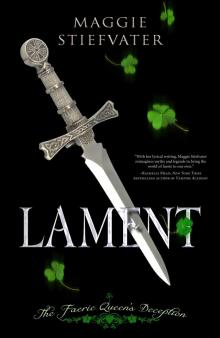 Lament: The Faerie Queens Deception
Lament: The Faerie Queens Deception Sinner
Sinner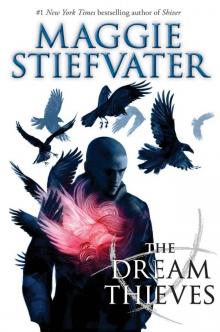 The Dream Thieves
The Dream Thieves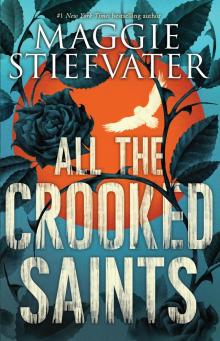 All the Crooked Saints
All the Crooked Saints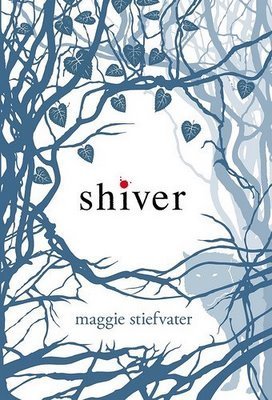 Shiver
Shiver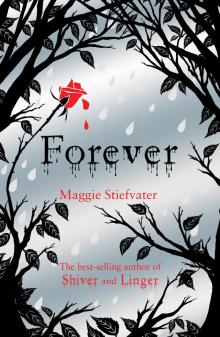 Forever
Forever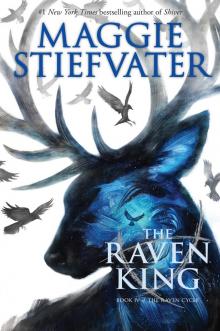 The Raven King
The Raven King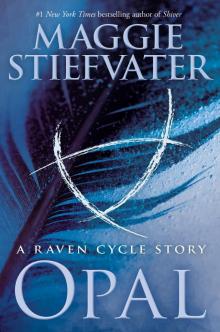 Opal
Opal Linger
Linger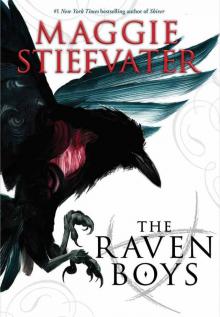 The Raven Boys
The Raven Boys The Scorpio Races
The Scorpio Races Hunted
Hunted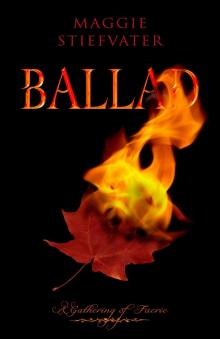 Ballad: A Gathering of Faerie
Ballad: A Gathering of Faerie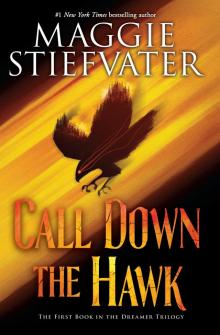 Call Down the Hawk
Call Down the Hawk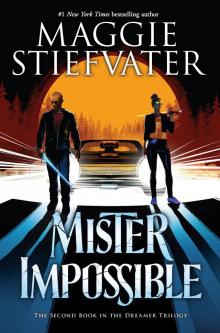 Mister Impossible
Mister Impossible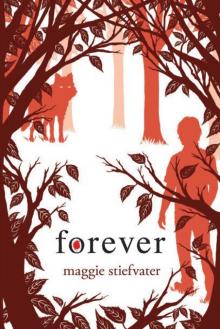 Wolves of Mercy Falls 03 - Forever
Wolves of Mercy Falls 03 - Forever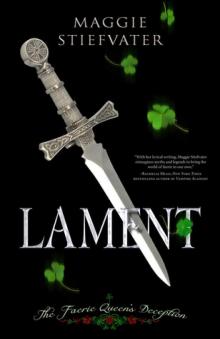 Lament
Lament![Maggie Stiefvater - [Wolves of Mercy Falls 02] Read online](http://i1.bookreadfree.com/i1/04/04/maggie_stiefvater_-_wolves_of_mercy_falls_02_preview.jpg) Maggie Stiefvater - [Wolves of Mercy Falls 02]
Maggie Stiefvater - [Wolves of Mercy Falls 02]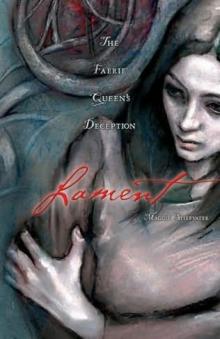 Lament: The Faerie Queen's Deception
Lament: The Faerie Queen's Deception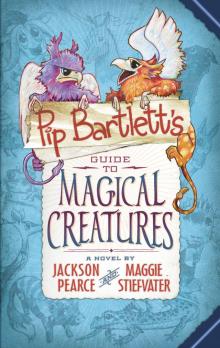 Pip Bartlett's Guide to Magical Creatures
Pip Bartlett's Guide to Magical Creatures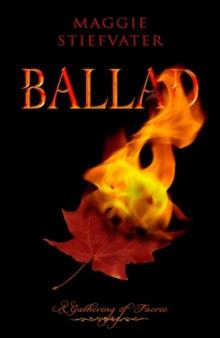 Ballad
Ballad